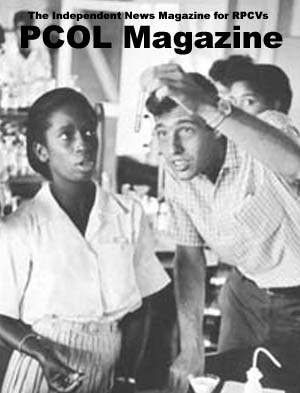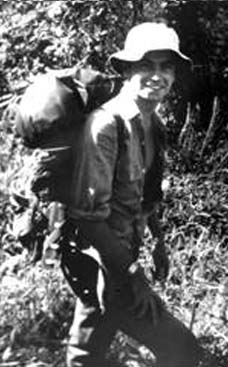2007.11.27: November 27, 2007: Headlines: Diplomacy: Public Diplomacy: New York Times: Defense Secretary Robert M. Gates calls for the United States government to commit more money and effort to “soft power” tools, including diplomacy, economic assistance and communications, because the military alone cannot defend America’s interests around the world
Peace Corps Online:
Peace Corps News:
Library:
Peace Corps: Public Diplomacy:
Peace Corps: Public Diplomacy: Newest Stories:
2007.11.27: November 27, 2007: Headlines: Diplomacy: Public Diplomacy: New York Times: Defense Secretary Robert M. Gates calls for the United States government to commit more money and effort to “soft power” tools, including diplomacy, economic assistance and communications, because the military alone cannot defend America’s interests around the world
Defense Secretary Robert M. Gates calls for the United States government to commit more money and effort to “soft power” tools, including diplomacy, economic assistance and communications, because the military alone cannot defend America’s interests around the world

Mr. Gates called for “a dramatic increase in spending on the civilian instruments of national security — diplomacy, strategic communications, foreign assistance, civic action and economic reconstruction and development.” Mr. Gates joked that “having a sitting secretary of defense travel halfway across the country to make a pitch to increase the budget of other agencies might fit into the category of ‘man bites dog’ or, for some back in the Pentagon, blasphemy,” and he acknowledged that “it is certainly not an easy sell politically.” The defense secretary also said the United States government must improve its skills at public diplomacy and public affairs to better describe the nation’s strategy and values to a global audience. “We are miserable at communicating to the rest of the world what we are about as a society and a culture, about freedom and democracy, about our policies and our goals,” he said. “It is just plain embarrassing that Al Qaeda is better at communicating its message on the Internet than America.” Mr. Gates expressed regret over decisions by previous administrations to cut the United States Agency for International Development and to abolish the United States Information Agency and divide its responsibilities among other offices. The defense secretary urged the creation of “a permanent, sizable cadre of immediately deployable experts with disparate skills.” These people, he said, would be drawn from the civilian world — with expertise in such areas as agriculture, urban infrastructure and law — to work alongside the military and help rebuild and stabilize world trouble spots.
Defense Secretary Robert M. Gates calls for the United States government to commit more money and effort to “soft power” tools, including diplomacy, economic assistance and communications, because the military alone cannot defend America’s interests around the world
Defense Secretary Urges More Spending for U.S. Diplomacy
By THOM SHANKER
Published: November 27, 2007
WASHINGTON, Nov. 26 — Defense Secretary Robert M. Gates called Monday for the United States government to commit more money and effort to “soft power” tools, including diplomacy, economic assistance and communications, because the military alone cannot defend America’s interests around the world.
Defense Secretary Robert M. Gates, right, with Jon Wefald, Kansas State University’s president, after a speech on Monday.
In a speech at Kansas State University, the Pentagon chief forcefully advocated a larger budget for the State Department. Mr. Gates noted that military spending — even without war costs for Iraq and Afghanistan — totals nearly half a trillion dollars annually, compared with a State Department budget of $36 billion.
“We must focus our energies beyond the guns and steel of the military, beyond just our brave soldiers, sailors, marines and airmen,” he said. “We must also focus our energies on the other elements of national power that will be so crucial in the years to come.”
Mr. Gates, who took over the top Pentagon job last December, said that “based on my experience serving seven presidents, as a former director of C.I.A. and now as secretary of defense, I am here to make the case for strengthening our capacity to use ‘soft power’ and for better integrating it with ‘hard power.’ ”
One priority is money, Mr. Gates said. He called for “a dramatic increase in spending on the civilian instruments of national security — diplomacy, strategic communications, foreign assistance, civic action and economic reconstruction and development.”
Mr. Gates joked that “having a sitting secretary of defense travel halfway across the country to make a pitch to increase the budget of other agencies might fit into the category of ‘man bites dog’ or, for some back in the Pentagon, blasphemy,” and he acknowledged that “it is certainly not an easy sell politically.”
The defense secretary also said the United States government must improve its skills at public diplomacy and public affairs to better describe the nation’s strategy and values to a global audience.
“We are miserable at communicating to the rest of the world what we are about as a society and a culture, about freedom and democracy, about our policies and our goals,” he said. “It is just plain embarrassing that Al Qaeda is better at communicating its message on the Internet than America.”
Mr. Gates expressed regret over decisions by previous administrations to cut the United States Agency for International Development and to abolish the United States Information Agency and divide its responsibilities among other offices.
The defense secretary urged the creation of “a permanent, sizable cadre of immediately deployable experts with disparate skills.” These people, he said, would be drawn from the civilian world — with expertise in such areas as agriculture, urban infrastructure and law — to work alongside the military and help rebuild and stabilize world trouble spots.
The State Department is working to build such a civilian response corps. At the same time, the State Department has struggled this year to fill its civilian contract positions for provincial reconstruction teams in Iraq and, indeed, to persuade enough Foreign Service officers to volunteer for duty there.
“We can expect that asymmetric warfare will be the mainstay of the contemporary battlefield for some time,” Mr. Gates said. “These conflicts will be fundamentally political in nature and require the application of all elements of national power. Success will be less a matter of imposing one’s will and more a function of shaping behavior of friends, adversaries and, most importantly, the people in between.”
Links to Related Topics (Tags):
Headlines: November, 2007; Diplomacy; Public Diplomacy
When this story was posted in December 2007, this was on the front page of PCOL:





Peace Corps Online The Independent News Forum serving Returned Peace Corps Volunteers 
 | Dodd vows to filibuster Surveillance Act
Senator Chris Dodd vowed to filibuster the Foreign Intelligence Surveillance Act that would grant retroactive immunity to telecommunications companies that helped this administration violate the civil liberties of Americans. "It is time to say: No more. No more trampling on our Constitution. No more excusing those who violate the rule of law. These are fundamental, basic, eternal principles. They have been around, some of them, for as long as the Magna Carta. They are enduring. What they are not is temporary. And what we do not do in a time where our country is at risk is abandon them." |
 | What is the greatest threat facing us now?
"People will say it's terrorism. But are there any terrorists in the world who can change the American way of life or our political system? No. Can they knock down a building? Yes. Can they kill somebody? Yes. But can they change us? No. Only we can change ourselves. So what is the great threat we are facing? I would approach this differently, in almost Marshall-like terms. What are the great opportunities out there - ones that we can take advantage of?" Read more. |
 | Senator Dodd's Peace Corps Hearings
Read PCOL's executive summary of Senator Chris Dodd's hearings on July 25 on the Peace Corps Volunteer Empowerment Act and why Peace Corps Director Ron Tschetter does not believe the bill would contribute to an improved Peace Corps while four other RPCV witnesses do. Highlights of the hearings included Dodd's questioning of Tschetter on political meetings at Peace Corps Headquarters and the Inspector General's testimony on the re-opening of the Walter Poirier III investigation. |
 | Paul Theroux: Peace Corps Writer
Paul Theroux began by writing about the life he knew in Africa as a Peace Corps Volunteer. His first first three novels are set in Africa and two of his later novels recast his Peace Corps tour as fiction. Read about how Theroux involved himself with rebel politicians, was expelled from Malawi, and how the Peace Corps tried to ruin him financially in John Coyne's analysis and appreciation of one of the greatest American writers of his generation (who also happens to be an RPCV). |
 | Ambassador revokes clearance for PC Director
A post made on PCOL from volunteers in Tanzania alleges that Ambassador Retzer has acted improperly in revoking the country clearance of Country Director Christine Djondo. A statement from Peace Corps' Press Office says that the Peace Corps strongly disagrees with the ambassador’s decision. On June 8 the White House announced that Retzer is being replaced as Ambassador. Latest: Senator Dodd has placed a hold on Mark Green's nomination to be Ambassador to Tanzania. |
 | Suspect confesses in murder of PCV
Search parties in the Philippines discovered the body of Peace Corps Volunteer Julia Campbell near Barangay Batad, Banaue town on April 17. Director Tschetter expressed his sorrow at learning the news. “Julia was a proud member of the Peace Corps family, and she contributed greatly to the lives of Filipino citizens in Donsol, Sorsogon, where she served,” he said. Latest: Suspect Juan Duntugan admits to killing Campbell. Leave your thoughts and condolences . |
 | He served with honor
One year ago, Staff Sgt. Robert J. Paul (RPCV Kenya) carried on an ongoing dialog on this website on the military and the peace corps and his role as a member of a Civil Affairs Team in Iraq and Afghanistan. We have just received a report that Sargeant Paul has been killed by a car bomb in Kabul. Words cannot express our feeling of loss for this tremendous injury to the entire RPCV community. Most of us didn't know him personally but we knew him from his words. Our thoughts go out to his family and friends. He was one of ours and he served with honor. |
Read the stories and leave your comments.

Some postings on Peace Corps Online are provided to the individual members of this group without permission of the copyright owner for the non-profit purposes of criticism, comment, education, scholarship, and research under the "Fair Use" provisions of U.S. Government copyright laws and they may not be distributed further without permission of the copyright owner. Peace Corps Online does not vouch for the accuracy of the content of the postings, which is the sole responsibility of the copyright holder.
Story Source: New York Times
This story has been posted in the following forums: : Headlines; Diplomacy; Public Diplomacy
PCOL40004
83














